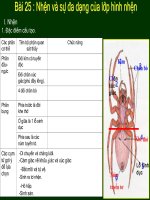Tải Giáo án tiếng Anh lớp 9 Tuần 9 sách mới - Giáo án điện tử môn tiếng Anh 9 theo tuần
Bạn đang xem bản rút gọn của tài liệu. Xem và tải ngay bản đầy đủ của tài liệu tại đây (98.77 KB, 6 trang )
<span class='text_page_counter'>(1)</span><div class='page_container' data-page=1>
<b>GIÁO ÁN TIẾNG ANH LỚP 9 </b>
<b> TUẦN 9</b>
<b>NĂM HỌC 2019 - 2020</b>
<b>Period: 25 Week: 9</b>
<b>A 45-MINUTE TEST</b>
<i><b>TEST 1</b></i>
<b>I. OBJECTIVES: </b>By the end of this Unit, students will be able to:
Write complex sentences with different dependent clauses
Use some common phrasal verbs correctly and appropriately
<b>II . PREPARATION: sub -board, pictures, cassette </b>
<b>III. PROCEDURES: </b>
<b>Teacher’s and students’ activities</b> <b>Content</b>
<b>IV- HOMEWORK:</b>
-Prepare <b>UNIT 4 (Getting started)</b>
<b>Period: 26 </b> <b>Week: 9</b>
<b>Unit 4: LIFE IN THE PAST</b>
<i><b>Lesson 1 - GETTING STARTED: Preserving the past</b></i>
<b>I. OBJECTIVES: By the end of this Unit, students will be able to:</b>
use the lexical items related to life in the past
<b>II . PREPARATION: sub -board, pictures, cassette </b>
<b>III. PROCEDURES: </b>
<b>Teacher’s and students’ activities</b> <b>Content</b>
<b>Activity 1: </b>
1 Ask Ss to look at the title of the conversation and the
picture. Ask them some questions:
</div>
<span class='text_page_counter'>(2)</span><div class='page_container' data-page=2>
• How do you understand the title ‘Preserving the past’?
Ss answer the questions as a class. Play the recording and
have Ss follow along.
a./ Ss work independently. Encourage them to answer
the questions without looking back at the conversation.
Then allow Ss to share answers. Check their answers as a
class.
b./ Ask Ss to find the expressions in the conversation and
read the context where they appear to make sure that they
understand the meanings of the expressions correctly. Ss
then do the matching. Correct the answers as a class. Ask Ss
<b>if they can think of some more expressions with the same</b>
meaning.
c./ Have Ss work independently to find the most suitable
response to each item. Ss can then exchange their answers.
T checks as a class and explains the answers where
necessary.
<b>Activity 2: </b>
Make sure Ss understand the meaning of the words/phrases
in the box. T can ask them to give some examples to show
that they understand the phrase ‘technological changes’. Ss
then work independently to complete the sentences. Have
them share their answers in pairs. Then elicit the answers
from the whole class.
Key:
1.Fathers make kites for sons.
2.Once every two months.
3.They used to come early,
trying to get a place near the
screen.
4.Only wealthy households.
5.Yes, he does. He said:
“Sometimes I wish I could go
back to that time.
Key:
1.c 2.a 3. d 4.b
Key:
1. Sure. 2.I can’t imagine
that. 3.How cool!
4.I wish I could go back to
that time. 5. How cool! 6.I
can’t imagine that.
Key:
1.a 2. d 3.c 4. b 5. e
6. F
</div>
<span class='text_page_counter'>(3)</span><div class='page_container' data-page=3>
<b>Activity 3: </b>
Have Ss work in small groups to come up with as many past
events and practices in their areas as possible.
Give the groups a time limit, for example, five minutes.
Have them present the list they have made to the class. As a
whole class, decide if these practices were specific to their
region or neighbourhood or were also practised elsewhere.
palm leaf conical hats, to
wear the traditional long dress
whenever they went out, to
stay at home as
housewives, ...
<b>IV- HOMEWORK:</b>
-Practice reading the dialogue.
-Write new words then learn them by heart.
-Copy the exercise into notebooks.
-Prepare <b>A CLOSER LOOK 1</b>
<b>Period: 27 </b> <b>Week: 9</b>
<b>Unit 4: LIFE IN THE PAST</b>
<i><b>Lesson 2 – A CLOSER LOOK 1</b></i>
<b>I. OBJECTIVES: By the end of this Unit, students will be able to:</b>
-identify in which situations to stress auxiliary verbs in sentences and say
these sentences correctly
- use used/didn’t use + to-infinitive to talk about past practices
<b>II . PREPARATION: sub -board, pictures, cassette </b>
<b>III. PROCEDURES: </b>
<b>Teacher’s and students’ activities</b> <b>Content</b>
<b>Grammar </b>
<b>Activity 1: </b>
Ask Ss to do the matching individually. Then allow
them to share their answers with a partner. Check as
a class.
Note: Ss might have difficulty with the meaning of
‘act out stories’, ‘go bare-footed’, and ‘dance to
drum music’. To check comprehension, T can ask Ss
to mime activities to ensure everyone has a thorough
Key:
</div>
<span class='text_page_counter'>(4)</span><div class='page_container' data-page=4>
understanding of the phrases.
<b>Activity 2:</b>
Ss work individually or in pairs. Ask them to
choose the correct answer for each sentence
first. They then read the sentence carefully to
determine the form and the tense of the verb. Check
the answers as a class.
<b>Activity 3:</b>
Have Ss work individually. Then they can exchange
their answers with a partner. Check as a class. Now
ask for volunteers, or select Ss, to make new
sentences using these words and phrases. Let the
rest of the class decide whether the sentence makes
sense or not. Try to give lots of Ss a go, not just the
ones who are the most extrovert in the class.
<b>Activity 4:</b>
These words have similar meanings. Before doing
the task, ask Ss to cover the REMEMBER!box and
elicit the definitions if possible. Then allow them to
read the definitions before doing the task. Have Ss
read each sentence and decide what part of speech is
missing from the sentence. For example, sentence 1
needs a noun because this word stands after article
‘a’. They then complete all the sentences. Confirm
the correct answers as a class.
<b>Activity 5:</b>
Ask Ss to note all the auxiliaries they find in the
sentences first. Discuss with them which ones they
think will be stressed. Play the recording. Ss listen
and underline the stressed auxiliaries. They then
repeat the sentences with a focus on the stressed
Key:
1.kept a diary 2. entertain
themselves 3.preserve our traditions
4.Use your imagination 5.acting
out stories
6. collect the post 7. going
bare-footed 8. dance to drum music
Key:
1.seniority 2.illiterate 3.street
vendors
4.strict rules 5. Physical 6.face to
face
Key:
1.habit 2.behaviour 3.tradition
4. habit 5. practice 6. Behaviour
Key + Audio script:
</div>
<span class='text_page_counter'>(5)</span><div class='page_container' data-page=5>
ones.
Since Ss often see auxiliaries as unstressed, it is a
good idea to give Ss some initial guidance from the
REMEMBER!box under exercise 5before they
actually do the exercise.
<b>Activity 6:</b>
Have Ss work individually to stress the auxiliaries.
Ask them to refer to the REMEMBER! box as they
do the exercise. Then play the recording. Ss
listen, check, and say the sentences. Call on
some Ss to say the sentences individually.
2.They can see the rain coming in
from the west.
3.You did make me laugh!
4.He hasn’t handed in his
assignment.
5. I don’t like the idea of going
there at night.
6.Sam doesn’t like fast food but I
do
Key + Audio script:
1.- The men in my village used to
catch fish with a spear.
- Could you do that?
- No, I couldn’t.
2. I have told you many times not
to leave the door open.
3. We’re going to visit Howick, a
historical village.
4. - You aren’t going to the party?
Is it because you can’t dance?
- I can dance. Look!
5. - I hope she doesn’t do any
damage to the car.
- Don’t worry. She does know how
to drive.
<b>IV- HOMEWORK:</b>
-Write new words then learn them by heart.
-Copy the exercise into notebooks.
-Prepare <b>A CLOSER LOOK 2</b>
Mời bạn đọc tham khảo thêm tài liệu Tiếng Anh lớp 9 tại đây:
Bài tập Tiếng Anh lớp 9 theo từng Unit:
</div>
<span class='text_page_counter'>(6)</span><div class='page_container' data-page=6></div>
<!--links-->









